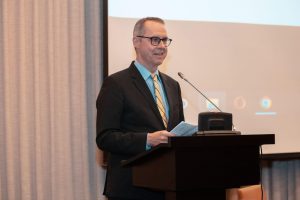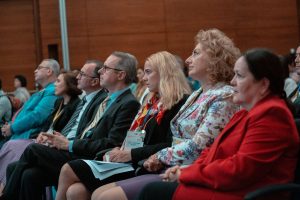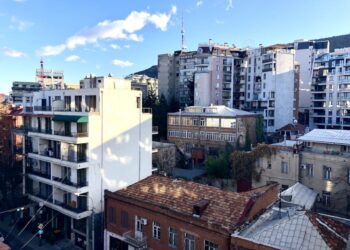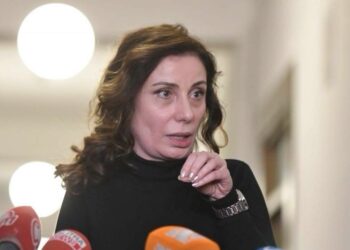DVV International Georgia in cooperation with DVV International Armenia and Georgian Adult Education Network hosted the international conference “Adult Learning and Education in the South Caucasus: The Milestones” on September 28 to 29 September. The purpose of the conference was to compile and evaluate DVV International’s regional operations.
The past 20 years DVV International has conducted operations in Georgia and Armenia in the South Caucasus. Promoting Lifelong Learning (LLL) and Adult Learning and Education (ALE) at all levels has been the key objective. The main goals of cooperation at the governmental, institutional, and individual levels have been to advocate for sustainable ALE structures, increase national level investment in ALE and LLL, raise awareness of the benefits of ALE and lower participation costs, and build the capacity of ALE institutions and professionals.
14 adult education facilities in Georgia and 5 in Armenia were constructed using the German ALE concept. Each year, they offer multi-component ALE programs to more than 20,000 individuals in an effort to promote their continued growth, employment, and improved quality of life.
GEORGIA TODAY received exclusive remarks on the international conference from Yana Drahovenko-Kaliukina, Project Manager at DVV International of Ukraine, and Lali Santeladze, Georgia Country Director of DVV International.
“We advocate for adult education across the world, and the conference’s theme is crucial there as well. Particularly now, with so many educational services and programs available in Ukraine. Internally displaced people, as an example. Numerous individuals lost their employment as a result of continuous issues, necessitating the acquisition of new skills and expertise. Utilizing the resources of adult education, we aim to assist individuals,” Drahovenko-Kaliukina told us.
“Stakeholders from Georgia must provide us with further information about these subjects and how they are arranged here. Adult education is conducted in Georgia and Ukraine in similar methods. We share certain common goals and historical themes, including this particular conflict. We thus have a similar course of action,” added the Project Manager of DVV International Ukraine.
Lali Santeladze said that the primary goal of the conference is to explore issues related to adult learning while also fostering an atmosphere where scholars and individuals involved in adult learning can learn from one another and exchange experiences.
“With the exception of Germany, none of the nations represented here have adult learning as a political priority,” she stated.
“We want adult learning to become a priority. We need to keep learning and growing since adulthood is where we spend the majority of our time. Adult learning is limited to the public. We don’t want it to be limited,” Santeladze added.
“We operate on three levels. On the micro level, we have 14 adult learning centers and will open a 15th one the following year, all of which are located in areas where we provide a variety of adult learning packets. On a meso level, we collaborate with businesses and providers of adult education. We provide them financial assistance. On a macro level, we collaborate with the government in an effort to make adult learning a political reality. Therefore, creating possibilities for adult learning will be a top priority for both national and regional governments,” said Santeladze.

“It is a joy to be at this genuinely international conference,” the German Ambassador to Georgia said as he welcomed participants from several nations. He mentioned that DVV International has accomplished a lot of milestones throughout the course of its remarkable 20-year career in the South Caucasus.
“Education is at the heart of everything. It is also a human right. A crucial component of the educational system is sustainable frameworks for ongoing adult education,” he noted.
“Regarding education, three principles should be grasped. The first tenet is that the best understanding of education is a holistic one. The second tenet is that education is a public good. The third tenet is that no one should be left behind in their pursuit of education. We Germans believe that public education systems are essential,” Fischer highlighted.
In his address, the Ambassador of Germany to Georgia mentioned that the improvement of people’s skill sets so they may apply their abilities to occupations is a priority in Georgia and, it is hoped, in other nations as well. With the right skills, people may find decent employment in their nation, contribute to its economic prosperity, and support its steady and peaceful growth, he said.
“On a wider note, I believe we are facing three key challenges that are all connected to education,” Fischer emphasized.
The capacity to “defend rules based on international order” was identified as the first problem. “It is being contested most brutally by Russian attacks in Ukraine. The rule of law is what we desire. Instead of using force, rule through negotiation and agreement,” said Fischer.
The second issue that was raised was the urgent nature of the environmental and climatic catastrophe, which is why education is necessary.
Fischer recognized the final difficulty. In the era of digitalized education and machine learning algorithms, both as societies and as people, “we are up against a challenge to our sovereignty.” “We must ensure that the machine and algorithm digitalization system is under our control. We must educate ourselves and acquire information in order to achieve it,” he stated.
“Those are three global challenges we all face and education is a key part of solving them,” the Ambassador sent his best wishes for a fruitful conference.
The attendees were also welcomed by Valerian Gobronidze, who also emphasized DVV International’s support and contribution to their work in Georgia. He added that a new, unified education and science plan for the years 2022–2030 has been established by the Ministry of Education and Science.
“In order to ensure strategic development of adult education the government will take several steps in the next ten years,” stated Gobronidze.
Lali Santeladze, welcomed conference participants and dedicated a special greeting to her Ukrainian colleagues on the conference opening. “I want you to know that our thoughts, feelings, and support are with you. We also wish you a speedy and complete victory,” she underlined.
By expressing the delight in seeing a lot of like-minded individuals who support adult education, who feel that they can support this crucial component of the educational system, and who think that adult education is a key strategy for improving people’s quality of life and the economic health of our nations,” Santeladze further remarked the necessity of this conference.
Maia Abramovska, Georgia Country Director of DVV International, welcomed attendees to the conference with the words, “We are really delighted to have you here to our conference devoted to the ALE in the South Caucasus milestones.”

The invited guests provided a summary of the significant work completed by DVV International at the conference’s opening. Effective ways for coping with adult learning were also examined, along with present and foreseeable difficulties.
The Conference gathered ALE experts, policymakers, decision-makers, and practitioners who concur that adult education must be acknowledged as a public good and that the administrative and financial authority should be strengthened to allow for greater flexibility and freedom in contributions to adult skill development.
Based on the best European practices, including the implementation of targeted holistic AE activities, the conference participants discussed and offered proposals on how to promote reforms and create a sustainable adult education system in Armenia and Georgia.
The Conference promoted professional discussion among stakeholders and exchanges about the state of the global ALE sector and its potential effects on local possibilities in the South Caucasus.
There were over 80 ALE experts, policymakers, decision-makers, and practitioners in attendance. Participants were from Germany, EU and non-EU countries, as well as the three DVV International regions of the Caucasus and Southeast Europe, Ukraine/Moldova, and Central Asia.
By Sophie Hodler














